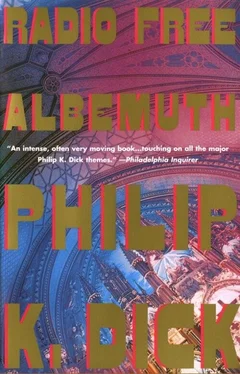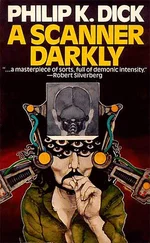Philip Dick - Radio Free Albemuth
Здесь есть возможность читать онлайн «Philip Dick - Radio Free Albemuth» весь текст электронной книги совершенно бесплатно (целиком полную версию без сокращений). В некоторых случаях можно слушать аудио, скачать через торрент в формате fb2 и присутствует краткое содержание. Жанр: Фантастика и фэнтези, на английском языке. Описание произведения, (предисловие) а так же отзывы посетителей доступны на портале библиотеки ЛибКат.
- Название:Radio Free Albemuth
- Автор:
- Жанр:
- Год:неизвестен
- ISBN:нет данных
- Рейтинг книги:4 / 5. Голосов: 1
-
Избранное:Добавить в избранное
- Отзывы:
-
Ваша оценка:
- 80
- 1
- 2
- 3
- 4
- 5
Radio Free Albemuth: краткое содержание, описание и аннотация
Предлагаем к чтению аннотацию, описание, краткое содержание или предисловие (зависит от того, что написал сам автор книги «Radio Free Albemuth»). Если вы не нашли необходимую информацию о книге — напишите в комментариях, мы постараемся отыскать её.
Radio Free Albemuth — читать онлайн бесплатно полную книгу (весь текст) целиком
Ниже представлен текст книги, разбитый по страницам. Система сохранения места последней прочитанной страницы, позволяет с удобством читать онлайн бесплатно книгу «Radio Free Albemuth», без необходимости каждый раз заново искать на чём Вы остановились. Поставьте закладку, и сможете в любой момент перейти на страницу, на которой закончили чтение.
Интервал:
Закладка:
Philip K. Dick
Radio Free Albemuth
Prologue
In 1932 in April a small boy and his mother and father waited on an Oakland, California, pier for the San Francisco ferry. The boy, who was almost four years old, noticed a blind beggar, huge and old with white hair and beard, standing with a tin cup. The little boy asked his father for a nickel, which the boy took over to the beggar and gave him. The beggar, in a surprisingly hearty voice, thanked him and gave him back a piece of paper, which the boy took to his father to see what it was.
"It tells about God," his father said.
The little boy did not know that the beggar was not actually a beggar but a supernatural entity visiting Earth to check up on people. Years later the little boy grew up and became a man. In the year 1974 that man found himself in terrible difficulties, facing disgrace, imprisonment, and possible death. There was no way for him to extricate himself. At that point the supernatural entity returned to Earth, loaned the man a part of his spirit, and saved him from his difficulties. The man never guessed why the supernatural entity came to rescue him. He had long ago forgotten the great bearded blind beggar and the nickel he had given him.
I speak now of these matters.
PART ONE
Phil
My friend Nicholas Brady, who in his own mind helped save the world, was born in Chicago in 1928 but then moved right to California. Most of his life was spent in the Bay Area, especially in Berkeley. He remembered the metal hitching posts in the shape of horses" heads in front of the old houses in the hilly part of the city, and the electric Red Trains that met the ferries, and, most of all, the fog. Later, by the forties, the fog had ceased to lie over Berkeley in the night.
Originally Berkeley, at the time of the Red Trains and the streetcars, was quiet and underpopulated except for the University, with its illustrious frat houses and fine football team. As a child Nicholas Brady took in a few football games with his father, but he never understood them. He could not even get the team song right. But he did like the Berkeley campus with the trees and the quiet groves and Strawberry Creek; most of all he liked the sewer pipe through which the creek ran. The sewer pipe
I was the best thing on the campus. In summer, when the creek was low, he crawled up and down it. One time some people called him over and asked if he was a college student. He was eleven years old then.
I asked him once why he chose to live his life out in Berkeley, which by the forties had become overcrowded, noisy, and afflicted by angry students who fought it out at the Co-op market as if the stacks of canned food were barricades.
"Shit, Phil," Nicholas Brady said. "Berkeley is my home." People who gravitated to Berkeley believed that, even if they had only been there a week. They claimed no other place existed. This became particularly true when the coffeehouses opened up on Telegraph Avenue and the free speech movement started. One time Nicholas was standing in line at the Co-op on Grove and saw Mario Savio in line ahead of him. Savio was smiling and waving at admirers. Nicholas was on campus the day the PHUQUE sign was held up in the cafeteria, and the cops busted the guys holding it. However, he was in the bookstore, browsing, and missed the whole thing.
Although he lived in Berkeley for ever and ever, Nicholas attended the University for only two months, which made him different from everyone else. The others attended the University in perpetuity. Berkeley had an entire population of professional students who never graduated and who had no other goal in life. Nicholas's nemesis vis-a-vis the University was ROTC, which in his time was still going strong. As a child Nicholas had gone to a progressive or Communist-front nursery school. His mother, who had many friends in the Communist Party in Berkeley in the thirties, sent him there. Later he became a Quaker, and he and his mother sat around in Friends Meeting the way Quakers do, waiting for the Holy Spirit to move them to speak. Nicholas subsequently forgot all that, at least until he enrolled at Cal and found himself given an officer's uniform and an M-l rifle. Thereupon his unconscious fought back, burdened by old memories; he damaged the gun and could not go through the manual of arms; he came to drill out of uniform; he got failing grades; he was informed that failing grades in
ROTC meant automatic expulsion from Cal, to which—Nicholas said, "What's right is right."
However, instead of letting them expel him, he quit.
He was nineteen years old and his academic career was ruined. It had been his plan to become a paleontologist.
The other big university in the Bay Area, which was Stanford, cost far too much for him. His mother held the minor post of clerk for the US Department of Forestry, in a building on campus; she had no money. Nicholas faced going to work. He really hated the University and thought of not returning his uniform. He thought of showing up at drill with a broom and insisting it was his
M-l rifle. He never thought of firing the M-l rifle at his superior officers, though; the firing pin was missing.
Nicholas, in those days, was still in touch with reality.
The matter of returning his officer's uniform was solved when the University authorities opened his gym locker and took the uniform out of it, including both shirts. Nicholas had been formally severed from the military world; moral objections, more thoughts of brave demonstrations, vanished from his head, and in the fashion of students attending Cal he began roaming the streets of Berkeley, his hands stuck in the back pockets of his Levi's, gloom on his face, uncertainty in his heart, no money in his wallet, no definite future in his head. He still lived with his mother, who was tired of the 1 arrangement. He had no skills, no plans, only inchoate anger. As he walked along he sang a left-wing marching song from the International Brigade of the Loyalist Army of Spain, a Communist brigade made up mostly of Germans. The song went:
Vor Madrid im Schiitzengraben, In der Stunde der Gefahr, Mil den eisernen Brigaden, Sein Herz voll Hass geladen, Stand Hans, der Kommissar.The line- he liked best was "Sein Herz voll Hass geladen," which meant "His heart full of hate." Nicholas sang that over and over again as he strode along Berkeley Way, down to Shattuck, and then up Dwight Way back to Telegraph. Nobody noticed him because what he was doing was not unusual in Berkeley at that time. One often saw as many as ten students striding along in jeans singing left-wing songs and pushing people out of the way. "
At the corner of Telegraph and Channing the woman behind the counter at University Music waved at him, because Nicholas often hung around there browsing through the records. So he went inside.
"You don't have your uniform on," the woman said.
"I've dropped out of the fascist university," Nicholas said, which certainly was true.
Pat excused herself to wait on a real customer, so he took an album of the Firebird Suite into a listening booth and put on the side where the giant egg cracks open. It fitted his mood, although he was not certain what came out of the egg. The picture on the album cover just showed the egg, and someone with a spear evidently going to break the egg.
Later on, Pat opened the door of the listening booth, and they talked about his situation.
"Maybe Herb would hire you here," Pat said. "You're in the store all the time, you know the stock, and you know a lot about classical music."
"I know where every record in the store is," Nicholas said, excited at the idea.
"You'd have to wear a suit and tie."
"I have a suit and tie," Nicholas said.
Going to work for University Music at nineteen was probably the greatest move of his life, because it froze him into a mold that never broke, an egg that never opened - or at least did not open for twenty-five more years, an awfully long time for someone who had really never done anything but play in the parks of Berkeley, go to the Berkeley public schools, and spend Saturday afternoons at the kiddies" matinee at the Oaks Theater on Solano Avenue, where they showed a newsreel, a selected short subject, and two cartoons before the regular subject, all for eleven cents.
Читать дальшеИнтервал:
Закладка:
Похожие книги на «Radio Free Albemuth»
Представляем Вашему вниманию похожие книги на «Radio Free Albemuth» списком для выбора. Мы отобрали схожую по названию и смыслу литературу в надежде предоставить читателям больше вариантов отыскать новые, интересные, ещё непрочитанные произведения.
Обсуждение, отзывы о книге «Radio Free Albemuth» и просто собственные мнения читателей. Оставьте ваши комментарии, напишите, что Вы думаете о произведении, его смысле или главных героях. Укажите что конкретно понравилось, а что нет, и почему Вы так считаете.









